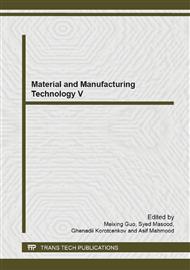[1]
N. Li, S. Wang, Y. Li: A Hybrid Approach of GA and ACO for VRP. Journal of Computational Information Systems. Vol. 7 (2011), p.4939.
Google Scholar
[2]
K. Wang, C. Ye: The Competitive Decision Algorithm for the Vehicle Routing Problem with Simultaneous Delivery and Pickup. Journal of Computational Information Systems. Vol. 9 (2013), p.3189.
Google Scholar
[3]
C. D. J. Waters: Vehicle-scheduling problems with uncertainty and omitted customers. Journal of the Operational Research Society. Vol. 40 (1989), p.1099.
DOI: 10.2307/2582919
Google Scholar
[4]
M. Dror, G. Laporte, P. Trudreau: Vehicle routing with stochastic demands: Properties and solution frameworks. Transportation science. Vol. 23 (1989), p.166.
DOI: 10.1287/trsc.23.3.166
Google Scholar
[5]
C. Bastian, K.A. Rinnooy: The stochastic vehicle routing problem revisited. European Journal of Operational Research. Vol. 56 (1992), p.407.
DOI: 10.1016/0377-2217(92)90323-2
Google Scholar
[6]
B.D. Liu, K.K. Lai: Stochastic programming models for vehicle routing problems. Focus on computational neurobiology. Nova Science Publishers, Inc. Vol. 1 (2004), p.13.
Google Scholar
[7]
R. Cheng, M. Gen, T. Tozawa: Vehicle routing problem with fuzzy due-time using genetic algorithm. Japanese Journal Fuzzy Theoy System. Vol. 7 (1995), p.1050.
DOI: 10.3156/jfuzzy.7.5_1050
Google Scholar
[8]
Y. Zheng, B. Liu: Fuzzy vehicle routing model with credibility measure and its hybrid intelligent algorithm. Applied Mathematics and Computation. Vol. 176 (2006), p.673.
DOI: 10.1016/j.amc.2005.10.013
Google Scholar
[9]
J.Y. Zhang, J. Li: A hybrid genetic algorithm of fuzzy vehicle routing problem. Journal of Engineering Management. Vol. 19 (2005), p.23, In Chinese.
Google Scholar
[10]
E.B. Cao, M.Y. Lai: Vehicle routing problem study with fuzzy demands. System Engineering. Vol. 25 (2007), p.14, In Chinese.
Google Scholar
[11]
L.X. Rong: Fuzzy simulation of vehicle routing problem under condition of fuzzy demand. Computer Engineering Application. Vol. 46 (2010), p.209, In Chinese.
Google Scholar
[12]
C.I. Hsu, S.F. Hung, H.C. Li: Vehicle routing problem with time-windows for perishable food dilivery. Journal of Food Engineering. Vol. 80 (2007), p.465.
DOI: 10.1016/j.jfoodeng.2006.05.029
Google Scholar
[13]
A. Osvald, L.Z. Stirn: A vehicle routing algorithm for the distribution of fresh vegetables and dimilar perishable food. Journal of food engineering. Vol. 85 (2008), p.285.
DOI: 10.1016/j.jfoodeng.2007.07.008
Google Scholar
[14]
H.K. Chen, C.F. Hsuch, M.S. Chang: Production scheduling and vehicle routing with time windows for perishable food products. Computers&operations research. Vol. 36 (2009), p.2311.
DOI: 10.1016/j.cor.2008.09.010
Google Scholar
[15]
B. Liu: Uncertainty theory. Springer-Verlag. Berlin, (2007).
Google Scholar


